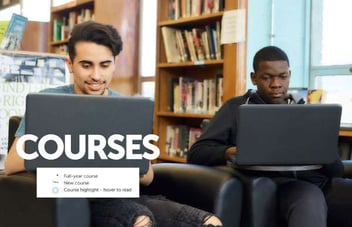4 ways online learning has broadened global education
Using an online partner is almost like having an additional faculty member, head of Korean international school says.
By Alison Hjelseth
As a small international educational institution, Gangnam International School in Seoul, South Korea serves about 57 students in grades one through 12. Our students receive personalized attention and the “best of the best” when it comes to instructors, but, thanks to online learning, our school’s size does limit how many courses we can offer those bright youngsters.
As a mastery-based school, we give students an entire year to develop mastery in a particular subject. Korean students are very focused on attending a university. Even at the first- and second-grade levels, their parents are concerned about what their child is going to study at the university.
To help students achieve their academic goals, our school started using VHS Learning for the 2021-22 school year. Here are four ways online learning has helped us offer a broader range of options for our students:
1. Expands our course catalog. Our own courses are focused on core educational requirements plus a limited number of arts-based electives (e.g., visual arts and music). Most of our students opt for either a science- or economics-focused track. If we can’t offer a science or economics course that a student wants to take during a particular year, we turn to our online learning partner for help filling that educational gap.
2. Helps students take a deep dive into their passion areas. Last year, one student who was interested in becoming a composer quickly “maxed out” the number of electives he could take and wanted to take a few AP music and composing classes, both of which were available in the online provider’s course catalog. We were so excited for him to be able to take those additional courses. He has since been accepted into music school and he’s studying music in the U.S. (where the majority of our students attend college), which is just wonderful.
3. Adds faculty members without extra cost. From my perspective, using an online partner is almost like having an additional faculty member. Its instructors are very proactive in communicating to me, so it’s like multiplying our school capacity. If you have a small-scale school, online learning is a very good way to have teachers who are passionate about what they’re doing, proactive and excited to teach your students meaningful material. As an administrator, I have the same knowledge that I’d have with our own teachers: I can access their material, student grades and meaningful feedback about individual students.
4. Leverages a supportive partner that cares, responds, and interacts. The online world can feel a bit disconnected and distant, but our online learning provider puts an extra effort into ensuring all students and instructors have the tools, resources and communication channels that they need for a positive online learning experience. I particularly like their proactive approach and responsive team members. With some other providers we’ve basically been left to figure things out for ourselves.
This article was originally published by District Administration.
Alison Hjelseth is the head of school at Gangnam International School in Seoul, South Korea.


